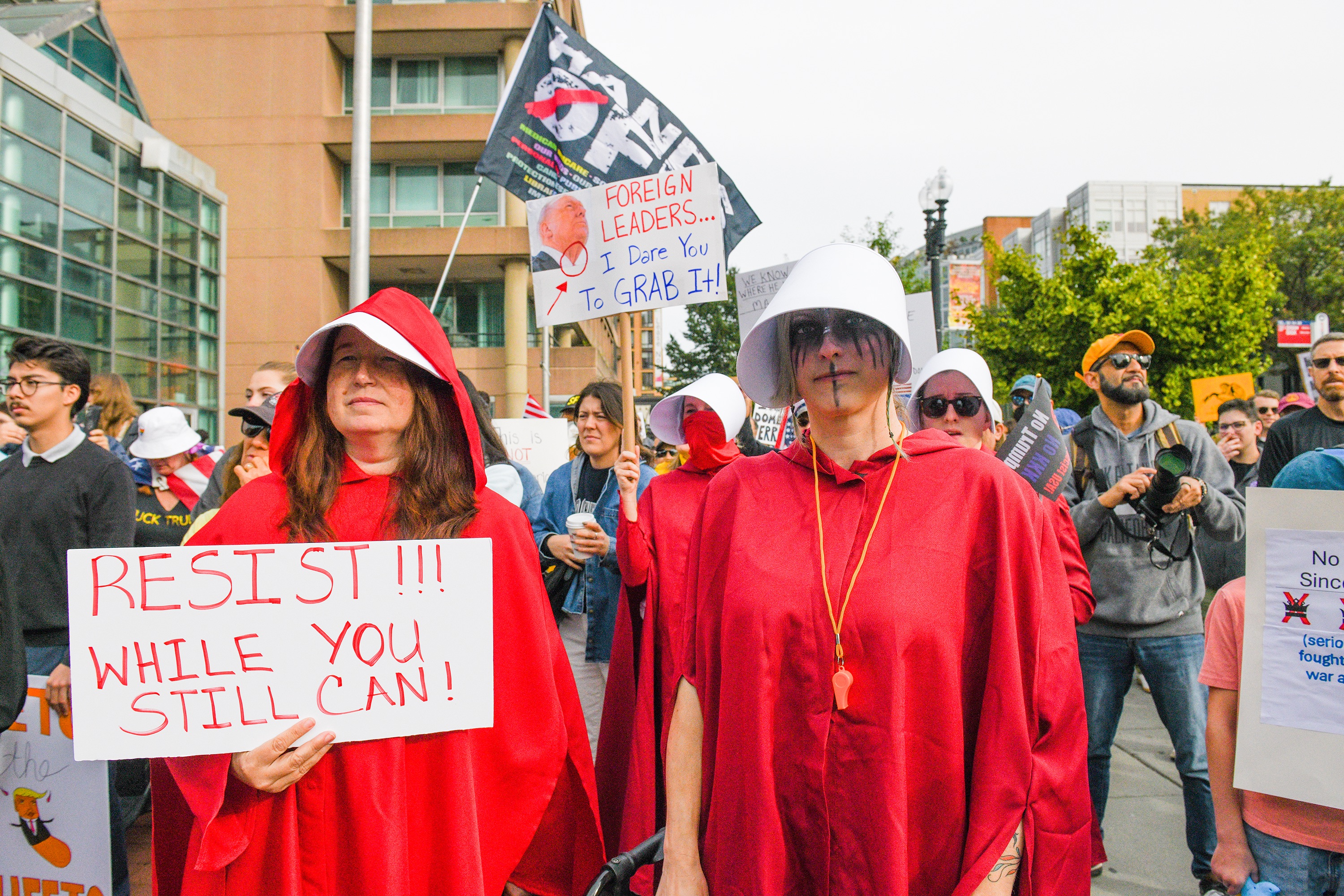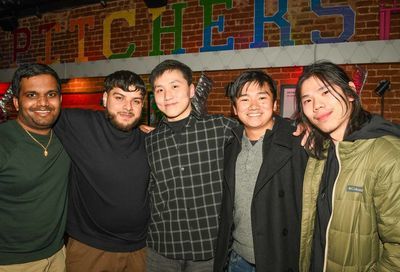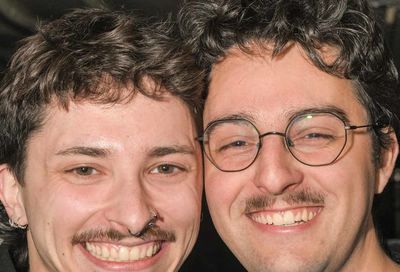World Pride Profile: Ron MacInnis, HIV Advocacy’s Ambassador
"I hope we find ways to use World Pride to educate and to enlighten and build empathy," says MacInnis, tireless in his community outreach.


Ron MacInnis spent November 30 struggling to make it to D.C. from Boston amid flight delays, to be here in time for World AIDS Day on Sunday, December 1. Considering this was to be the first time the AIDS Memorial Quilt was displayed on the White House South Lawn, it was a hallowed occasion, not to be missed. Certainly not for a D.C. resident who has been on the forefront of HIV/AIDS education and advocacy worldwide for decades.
“Given the political situation of the country, it was a little bittersweet, but it was lovely,” says MacInnis, alluding to the recent election. “Jeanne White[-Ginder], Ryan White’s mom, was there and she said a few words, along with the president and the first lady. It was a relatively small crowd for an outdoor White House event, but it was lovely to have the quilt and see all the folks in the HIV/AIDS community of activists and leaders and all that. Lots of familiar faces. Everyone from our local activists in D.C. to Tony Fauci. It was a nice mix of faces.”
Adding to the bittersweet mood was one face that was absent. A. Cornelius Baker, a 2005 Capital Pride Hero, former head of the National Association of People With AIDS and D.C.’s Whitman-Walker Clinic, and longtime friend and colleague of MacInnis has died in November leaving behind a monumental legacy intersecting HIV, the LGBTQ community, racial equity, and health.
“I met Cornelius back in the ’90s,” MacInnis recalls. “He and I and other HIV-positive people were part of these different networks, building coalitions and fundraising around the world. I remember going on several trips with him to different places. I remember watching Princess Diana’s funeral with him in a Toronto hotel room.”
Particularly, MacInnis recalls Baker’s Adams Morgan apartment being a fertile garden from which so much advocacy and activism grew, spreading out into the world.
“His apartment was kind of the social setting for all things LGBT and HIV,” says MacInnis, painting a picture of a space brimming with Baker’s eclectic art collection, beyond what might fit on every spare space of his walls. “There was always something happening. ‘Oh, come over — we’re going to Cornelius’s.’ Several decades of that. It’s a great loss.”
Working in this space of HIV, across the world, loss is not new to MacInnis. He knows how to work through it. He knows that he is lucky, in a sense, to have the opportunity. After all, he came so very close to death himself in the earlier days of HIV. In the mid-1990s, MacInnis arrived at Whitman-Walker Clinic with six T cells (CD4 count), rather than anything remotely close to the normal range of 500 to 1,200.
The path to D.C. and Whitman-Walker, which MacInnis credits with saving his life, thanks to new antiretroviral drugs of the era prescribed through the clinic, was far more complicated than his delayed flight the day before World AIDS Day. He did not grow up seeing much of the world. Actually, he got his first taste of the wider world on a church trip in his late teens. For 10 days, on the tiny Caribbean island nation of Dominica, he helped build a school. Looking back, he guesses his contribution may have been one wall, which possibly gave him early insight on how to break them down, too.
“I realized that in the grand lottery of life, depending on where you’re born and the circumstances you’re born into, life is very different,” MacInnis says of the insights gained on Dominica, relative to his working-class Boston upbringing. “Seeing the poverty that people lived with in this idyllic place was quite stark and stunning. It was an early education to me about inequities in the world and the need for people to think outside their community, to think about the rest of the world.”
Working his way through Framingham State University, studying political science and journalism, editing the school paper, MacInnis remembers gravitating toward the international students, fascinated by their various cultures. Applying for a Peace Corps job upon graduating was a perfect fit, leading to two years in the village of Masisi, in what was then Zaire, now the Democratic Republic of the Congo. From his lush, mountainous region of the DRC, he worked for the district’s chief medical officer in support of the area health center.
That experience — vaccinating children and sharing health education — had MacInnis primed to return to Boston and earn his master’s degree in public health. Still, he didn’t wander too far from the Peace Corps, working for the agency between semesters to train new recruits in Senegal. Then, right after graduation, he found similar work with an organization in Mali. His work visa required some routine health screening, including an HIV test. It was positive.
“It was quite devastating news,” says MacInnis. “I had to come home and seek care, because at that point it was quite advanced. I guess earlier tests had missed it.”
He was soon being treated at Whitman-Walker. Not only was HIV affecting his health, but also the trajectory of his career.
“I’d done public health work, but not HIV,” MacInnis says. “This stimulated me. This meant I should probably work in HIV. I came to D.C. without a job. I found one at a place called the Global Health Council. This organization was focused on advocacy, looking for someone in their HIV program. We got grants from a variety of organizations to educate policymakers on Capitol Hill and around the country, and to build networks of people living with AIDS around the world. I did that for many years. It was the beginning of the real community focus on HIV and really building community networks, networks of sex workers, networks of Gay men, drug users and other vulnerable people.”
Over the years and with different organizations, the work has taken MacInnis to every corner of the globe, working with U.S. embassies, working with journalists, working in the field, in the halls of power, and in conference rooms. MacInnis says he once tried to count the number of countries he’s been to in this effort to educate, advocate, to tear down walls built of stigma, and to build bridges of community. He counted about 50 before moving on to more productive pursuits. Good thing, too, as there’s still so much work to be done.
Today, as technical director for HIV at The Palladium Group international development firm, MacInnis has worked with LGBTQ community members in various countries. HIV, he says, continues to stalk “key populations — men who have sex with men, Trans people, drug users, sex workers.”
With Donald Trump returning to the White House, running on a campaign that particularly targeted Transgender people, it’s fair to ask if the new administration will hinder the work.
“Under the [first] Trump administration…he tried to slash the HIV programs, but Congress pushed back,” says MacInnis. “I read Project 2025 and what they have in mind for PEPFAR [President’s Emergency Plan for AIDS Relief]…. I know they want to try to maintain it, which is good. They want to maintain the success of the program, because it truly has been a bipartisan initiative, thank God. But I think they’re going to lean into what they think is more effective, like working with faith-based organizations and getting back to ‘family values.’ I don’t know what’s going to happen with LGBT programs.
“Regardless of who the president is, my experience over the past 30 years is that the communities are very resilient. And in some ways, adverse leadership strengthens the base. I’m hopeful that, if nothing else, it will allow us to see more of those groups maybe build into their self-agency more than they have in the past.”
MacInnis points to World Pride as one such opportunity, emphasizing that it’s meaningful for the community to come together on a world stage, to be out and proud.
“I hope we find ways to use World Pride to educate and to enlighten and build empathy — in addition to the fun that we’re going to have,” he says. “I know a lot of the folks on those committees, planning those events. It’s going to be great to have it in D.C. And it’s a nice opportunity not only to have some fun as a community, but to educate [legislators on] Capitol Hill a little bit better.”
The Homecoming Celebration of A. Cornelius Baker will be held Friday, Dec. 13, at 10 a.m., at the Washington National Cathedral. A livestream of the celebration will be available at www.cathedral.org.
Support Metro Weekly’s Journalism
These are challenging times for news organizations. And yet it’s crucial we stay active and provide vital resources and information to both our local readers and the world. So won’t you please take a moment and consider supporting Metro Weekly with a membership? For as little as $5 a month, you can help ensure Metro Weekly magazine and MetroWeekly.com remain free, viable resources as we provide the best, most diverse, culturally-resonant LGBTQ coverage in both the D.C. region and around the world. Memberships come with exclusive perks and discounts, your own personal digital delivery of each week’s magazine (and an archive), access to our Member's Lounge when it launches this fall, and exclusive members-only items like Metro Weekly Membership Mugs and Tote Bags! Check out all our membership levels here and please join us today!
























You must be logged in to post a comment.